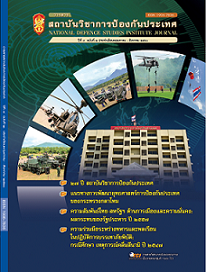ชีวอำนาจ : การจัดระเบียบความมั่นคงทางการเมือง (Biopower: Disciplining Security in Politics)
Main Article Content
Abstract
บทคัดย่อ
นักการเมืองในประเทศไทยถูกมองว่า เป็นผู้ที่มีพฤติกรรมการใช้อำนาจเพื่อการฉ้อฉลเห็นแก่ประโยชน์ส่วนตัวและพวกพ้อง นับตั้งแต่ประเทศไทยเริ่มมี “นักการเมือง” เกิดขึ้นจากการปฏิวัติเปลี่ยนแปลงระบอบการปกครองในปีพ.ศ. 2475 เป็นต้นมา จนกระทั่งมีการปฏิรูปทางการเมืองตามกฎหมายรัฐธรรมนูญปี พ.ศ.2540 และปี พ.ศ.2550 ยิ่งย้ำให้เห็นถึงความสำคัญประเด็นเรื่องจริยธรรมของผู้ดำรงตำแหน่งทางการเมือง การวิจัยครั้งนี้มีวัตถุประสงค์ ประการแรก เพื่อศึกษาบริบททางประวัติศาสตร์ของสังคมการเมืองไทยว่า มีกระบวนการผลิต สร้างนักการเมืองในระบอบประชาธิปไตยไทยอย่างไร ประการที่สอง เพื่อศึกษากระบวนการจัดระเบียบนักการเมือง ผ่านสิ่งที่ผู้วิจัยเรียกว่า “ชีวอำนาจ” และ “ชีวการเมือง” ในการพัฒนาจริยธรรมของนักการเมืองไทยซึ่งจะเป็นประเด็นเกี่ยวข้องกับความมั่นคงทางการเมืองของไทยด้วย
การวิจัยครั้งนี้เป็นการวิจัยเชิงคุณภาพ โดยใช้คำถามสำคัญของการวิจัยเป็นศูนย์กลางไปยึดโยงกับวัตถุประสงค์ของการวิจัยและดำเนินการวิจัยโดยการวิจัยเอกสาร และการสัมภาษณ์เจาะลึก กลุ่มเป้าหมาย 3 กลุ่ม จากตัวแทนจากสามสถาบัน ได้แก่ กลุ่มแรก คือ กลุ่มผู้วางกรอบกติกาทางการเมือง กลุ่มที่สอง กลุ่มนักการเมืองระดับชาติและระดับท้องถิ่น และกลุ่มที่สาม กลุ่มตัวแทนจากองค์กรที่เกี่ยวข้อง โดยนำข้อมูลที่ได้มาวิเคราะห์อย่างเป็นระบบ และนำเสนอแสดงข้อมูลในรูปของการบรรยายพรรณนาความ
ผลการศึกษาพบว่า 1) กระบวนการจัดระเบียบนักการเมืองผ่านกระบวนการเชิงสถาบัน แสดงความเป็นตัวตนของรัฐสมัยใหม่ที่ต้องการรักษาอำนาจทั้งเพื่อการป้องกันและปกป้องผลประโยชน์ของประชาชนทั้งด้านเศรษฐกิจ และกระบวนการสร้างเสริมคุณธรรมจริยธรรมและความโปร่งใสของนักการเมือง รัฐจึงสร้างระเบียบใหม่ขึ้นมาเพื่อเป็นกลไกในการควบคุมและสร้างสรรค์ 2) ชีวอำนาจและชีวการเมือง ผ่านอำนาจตัวแทนที่มีอำนาจทั้งป้องกันและถอดถอนผ่านเทคนิคการใช้อำนาจอันซับซ้อนเพื่อสร้างความชอบธรรม หากพิจารณาที่มาของกระบวนการจัดระเบียบนักการเมืองมีความซับซ้อน โดยเริ่มจากระเบียบสำนักนายกรัฐมนตรีว่าด้วยมาตรฐานทางคุณธรรมและจริยธรรมของข้าราชการการเมือง พ.ศ.2543 และ พ.ศ.2551 เป็นกลไกที่สร้างอำนาจใหม่ขึ้นมาเพื่อกำกับควบคุมพฤติกรรมผู้ดำรงตำแหน่งทางการเมืองทั้งในระดับชาติและระดับท้องถิ่น แม้ว่าประเทศจะต้องมีเกณฑ์กลางซึ่งเป็นมาตรฐานกลางก็ตาม แต่ยังต้องเกาะเกี่ยวสถาบันกษัตริย์ ซึ่งเป็นศูนย์กลางอำนาจด้านจิตใจ และอำนาจตามกฎหมาย ซึ่งผู้นำองค์กรที่เกี่ยวข้องจะพยายามเชื่อมโยงให้การบังคับใช้ประมวลจริยธรรมมีความศักดิ์สิทธิ์และเกิดความชอบธรรมขึ้นซึ่งเป็นกระบวนการสร้างอำนาจเพื่อการควบคุมนักการเมืองของสังคม
ข้อเสนอแนะ 1) นายกรัฐมนตรีและคณะรัฐมนตรีจะต้องบังคับใช้ประมวลจริยธรรมของผู้ดำรงตำแหน่งทางการเมืองทั้งในระดับชาติและระดับท้องถิ่นอย่างเคร่งครัดอย่างมาก 2) หน่วยงานที่เกี่ยวข้อง อาทิ คณะกรรมการเลือกตั้ง รัฐสภา-วุฒิสภา สำนักงาน ป.ป.ช. และสำนักงานผู้ตรวจการแผ่นดิน ควรให้ความสำคัญของการบริหารจัดการที่มีธรรมาภิบาล หรือการสร้างการมีส่วนร่วมกับทุกภาคส่วน เพื่อเสริมสร้างและส่งเสริมอย่างเป็นระบบต่อเนื่องและมีการยกระดับการพัฒนาจริยธรรมของนักการเมืองทั้งในระดับชาติแลละระดับท้องถิ่น
คำสำคัญ : ชีวอำนาจ, การจัดระเบียบ, ความมั่นคง, การเมือง.
Abstract
Thai politicians are considered as those who take advantage of their power to their group’s and own benefits, cheating or committing corruption. The Siamese Revolution in 1932 and the Constitutional Reform in 1997 and 2007 reflect how important political ethics are. The objectives of this study were to investigate the political contexts in the Thai political history, with an emphasis on the process of how Thai politicians were produced in Thailand’s democratic system, and to study the process of the political reorganization through biopower and biopolitics to improve Thai politicians’ ethics.
This research is qualitative, aimed at relating the research questions to the objectives of the study. The research methodology included documentary research and in-depth interviews with key informants representing three groups: those who determined the framework of political regulations, national and regional politicians, and representatives from related organizations. The data were analyzed and, then, the findings were presented descriptively.
The research findings revealed that the political reorganization through the institutional process reflected the identity of the modern state emphasizing the power protection for the economic benefits of their own population and having their politicians maintain their moral integrity. Consequently, the state established new mechanisms as the regulations for the sake of control and creativity. In addition, it was found out that biopower and biopolitics were shaped by the agents’ complicated power which could protect and impeach politicians to maintain righteousness. Considering the initiation of complicated reorganizational process following the Office of the Prime Minister's Regulations for the Moral and Ethical Standards of Political Civil Servants 2000 and 2008, the reorganizational process was the new mechanism forming a new power that supervised the holders of political positions, both regionally and nationally. It is essential for the country to have standardized measures; however, the measures should concern royal institutions – the centers of hearts and legal power of which leaders of related organizations attempted to relate to the enforcement of strict codes of conduct to supervise politicians’ behaviors based on the principles of justice.
The prime minister and ministers were recommended to enforce the strict codes of conduct against regional and national politicians. In addition, related organizations and groups – including the Office of the Election Commission, the national Assembly, the Senate, the Office of the National Anti-Corruption Admission, and the Office of Ombudsman – should realize the significance of the administration on the principles of good governance or emphasize public participation to strengthen the reorganization continuously and improve the ethics of the regional and national politicians.
Key words: Biopower, Discipline, Security, Politics.
Article Details
The articles, images, tables, graphs, written content, and opinions published in this journal are solely those of the authors and do not necessarily reflect the views or positions of the National Defence Studies Institute or its academic affiliates.


